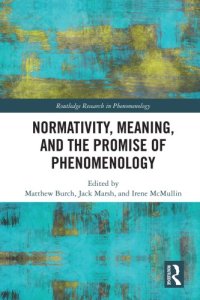The aim of this volume is to critically assess the philosophical importance of phenomenology as a method for studying the normativity of meaning and its transcendental conditions. Using the pioneering work of Steven Crowell as a springboard, phenomenologists from all over the world examine the promise of phenomenology for illuminating long-standing problems in epistemology, the philosophy of mind, action theory, the philosophy of religion, and moral psychology. The essays are unique in that they engage with the phenomenological tradition not as a collection of authorities to whom we must defer, or a set of historical artifacts we must preserve, but rather as a community of interlocutors with views that bear on important issues in contemporary philosophy. The book is divided into three thematic sections, each examining different clusters of issues aimed at moving the phenomenological project forward. The first section explores the connection between normativity and meaning, and asks us to rethink the relation between the factual realm and the categories of validity in terms of which things can show up as what they are. The second section examines the nature of the self that is capable of experiencing meaning. It includes essays on intentionality, agency, consciousness, naturalism, and moral normativity. The third section addresses questions of philosophical methodology, examining if and why phenomenology should have priority in the analysis of meaning. Finally, the book concludes with an afterword written by Steven Crowell. Normativity, Meaning, and the Promise of Phenomenology will be a key resource for students and scholars interested in the phenomenological tradition, the transcendental tradition from Kant to Davidson, and existentialism. Additionally, its forward-looking focus yields crucial insights into pressing philosophical problems that will appeal to scholars working across all areas of the discipline. Read more...
